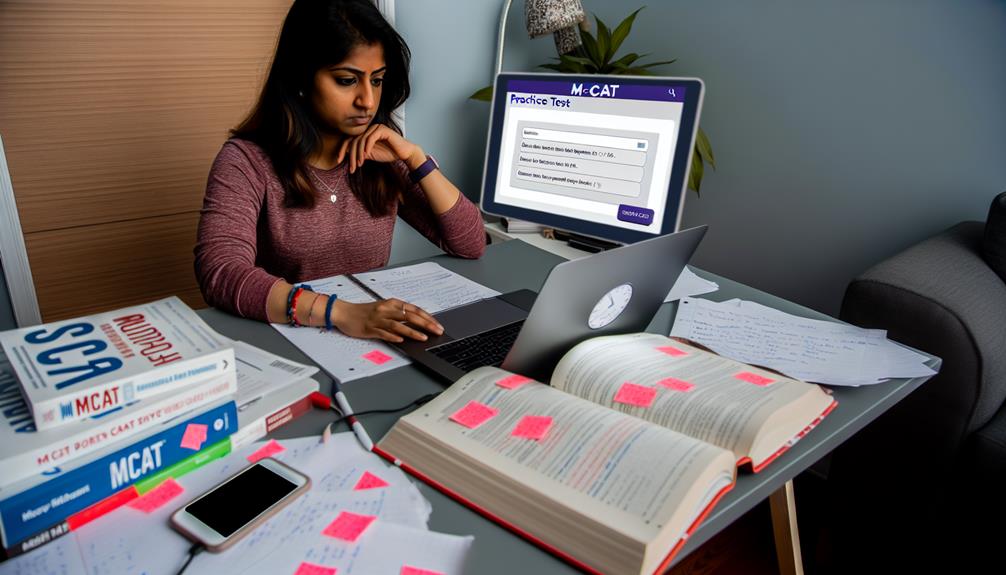To study effectively for the MCAT in the USA, start by understanding the test structure and content. Prioritize premed courses like biology, chemistry, and physics. Create a study schedule for 3 to 6 months, aiming for 300 to 500 total study hours. Utilize active recall and spaced repetition techniques to improve retention. Regularly take AAMC practice exams to mimic actual test conditions, and set aside time to review incorrect answers. Don't forget to manage test anxiety with mindfulness techniques. If you're keen on maximizing your prep, there's more valuable insight ahead.
Key Takeaways
- Develop a structured study timeline of 3 to 6 months, dedicating 300 to 500 hours to content mastery and practice exams.
- Begin with a diagnostic test to identify strengths and weaknesses, allowing for focused and efficient study sessions.
- Utilize active recall and spaced repetition techniques, employing tools like Anki or Quizlet for improved retention.
- Incorporate regular full-length practice exams, particularly from AAMC, to simulate test conditions and assess readiness.
- Manage test anxiety with mindfulness techniques and a supportive study network to boost confidence and reduce stress.
Understanding the MCAT Structure
Understanding the MCAT structure is essential for your success on this challenging exam. The MCAT consists of four sections: Biological and Biochemical Foundations, Chemical and Physical Foundations, Psychological, Social, and Biological Foundations, and Critical Analysis and Reasoning Skills. Each section requires you to analyze different types of content and skills, totaling 7.5 hours, including breaks.
When you take the MCAT, you'll receive a score ranging from 118 to 132 for each section, with a total possible score between 472 and 528. This scoring system reflects your performance compared to other students, making it crucial to aim for a competitive score. The average score for applicants in the 2021-2022 cycle was 505.9, while admitted students averaged 511.9, emphasizing the competitive nature of medical school admissions.
While the Critical Analysis and Reasoning section doesn't require prior knowledge, it tests your reading comprehension and analytical skills. Familiarizing yourself with the exam format and content will help you study effectively and develop strategies to succeed. Remember, understanding the structure is your first step toward mastering the MCAT and enhancing your admissions prospects.
Choosing the Right Courses
Choosing the right courses can considerably impact your MCAT preparation and overall readiness for medical school. To set yourself up for success, focus on completing key coursework that aligns with the MCAT content areas. Here are some essential steps to evaluate:
- Enroll in core premed courses like biology, chemistry, physics, and psychology to build a strong foundation.
- Aim to complete subjects relevant to the Biological Foundations and Chemical and Physical Foundations sections before your exam date.
- Include humanities and social sciences to enhance your critical thinking and reading comprehension for the Critical Analysis and Reasoning (CARS) section.
- Avoid overloading your schedule with multiple science classes in one semester. This guarantees adequate time for understanding and retention of the material.
Using MCAT prep books alongside your coursework can further bolster your study plan. Additionally, contemplate majoring in a field that aligns with your desired medical specialty, as this will provide deeper insights and prepare you better for medical school admissions. Making thoughtful choices about your coursework will ultimately enhance your understanding and retention, setting you on the path to MCAT success.
Developing a Study Timeline

Creating a structured study timeline is essential for effective MCAT preparation. Aim for a timeline spanning 3 to 6 months, dedicating around 300 to 500 total study hours. Start your study plan with a diagnostic test to identify your strengths and weaknesses. This initial assessment will guide your focused content review and help you set specific score goals.
Divide your study timeline into two phases. The first phase should prioritize content mastery, ensuring you grasp the necessary material. During the second phase, shift your focus to full-length practice tests and test-taking strategies. It's important to incorporate MCAT practice exams during this period.
In your final month, save four AAMC full-length practice exams. Take one each week leading up to your test day to build endurance and assess your readiness. Consistent weekly study hours are essential for improvement; aim for 10 to 20 study hours per week. This commitment can lead to a significant score increase—1.5 points per month with 10 hours or up to a 9-point boost over three months with 20 hours. Your structured timeline will set you up for success on the MCAT.
Effective Study Techniques
Effective study techniques can make a significant difference in your MCAT preparation. To maximize your study plan, consider these strategies:
- Integrate Active Recall and Spaced Repetition: Use flashcards through tools like Anki or Quizlet to enhance retention of key concepts. This approach reinforces your memory effectively.
- Schedule Full-Length Practice Exams: Incorporate MCAT practice tests regularly, especially in the final month. These exams help build stamina and simulate real test conditions. Be sure to review incorrect answers thoroughly for better understanding.
- Utilize Diverse Learning Resources: Engage with a variety of materials, including AAMC official resources, third-party prep books, and online platforms. This exposure helps you grasp different question formats and reinforces your content review.
- Participate in Collaborative Learning: Form study groups or seek peer support. Engaging with others keeps you motivated and allows for deeper discussions about complex topics.
Utilizing Practice Tests

Mastering the MCAT requires a strategic approach to practice tests, as they're vital for building both confidence and endurance. Start by incorporating AAMC practice exams into your MCAT test prep. These tests closely mimic the actual format and provide valuable insights into test-taking strategies. Schedule full-length practice tests at regular intervals, ideally beginning three months before your exam. Aim for at least four full-length exams in the final month to simulate real test conditions.
After completing each practice test, don't forget to allocate at least three hours to review content, focusing on incorrect answers. This reflection helps you understand your mistakes and reinforces learning on weaker topics. Additionally, consider third-party practice exams from reputable sources like Kaplan, Blueprint, and Princeton Review to diversify your question exposure.
Engage in self-testing techniques like using flashcards or online quizzes to improve retention and recall of key concepts. This approach not only enhances your knowledge but also boosts your chances of achieving a high score, which is essential for gaining admission to medical schools. By integrating these strategies, you'll be well-prepared and confident on test day.
Managing Test Anxiety
Test anxiety can feel overwhelming, but there are practical ways to manage it. Many MCAT test-takers experience this anxiety, but you can take steps to reduce it and improve your performance. Here are four effective strategies:
- Practice Mindfulness: Incorporate mindfulness and relaxation techniques into your routine. Research shows they can reduce anxiety levels by up to 30%.
- Simulate Test Day: During your practice exams, replicate the actual testing conditions. This familiarization can help you develop coping strategies and reduce anxiety.
- Take Breaks: Incorporate regular breaks during your study sessions. Short breaks can enhance cognitive performance by up to 20% and help keep your focus sharp.
- Build a Support Network: Connect with peers through study groups or seek out mentors. Having a strong support network can alleviate feelings of isolation and foster a sense of community.
Resources for MCAT Prep

When it comes to preparing for the MCAT, having the right resources at your disposal can make all the difference. You'll want to create a solid study plan that incorporates a mix of free online resources and essential review books. The AAMC provides invaluable resources, including free practice tests and an all-encompassing guide on "What's on the MCAT® Exam?" Additionally, Khan Academy offers extensive free online content tailored for MCAT preparation.
Here's a quick overview of some key resources:
| Resource Type | Examples |
|---|---|
| Free Online | AAMC resources, Khan Academy |
| Review Books | Kaplan, Princeton Review, Exam Krackers |
| Practice Tests | AAMC practice tests, Kaplan, Blueprint, Altius |
While popular prep courses from Kaplan and Princeton Review can be pricey, with costs over $2000, smaller companies provide more affordable options ranging from $400 to $999. Make sure to use these resources effectively as you prepare for test day, ensuring you feel confident and ready for the exam ahead!
Dos and Don'ts of Studying
Consistently applying effective study strategies can greatly enhance your MCAT preparation. To optimize your study for the MCAT, here are some important dos and don'ts:
- Do create a tailored study schedule that fits your learning style and includes regular review sessions to reinforce concepts and avoid last-minute cramming.
- Don't study in distracting environments; maintaining focus during practice sessions is vital for effective retention and understanding.
- Do utilize a variety of study methods, like flashcards and practice exams, to engage different learning modalities and improve comprehension of challenging topics.
- Don't rely solely on prep courses or tutors. Self-study is equally effective and allows you to personalize your pacing and target weak areas.
Embrace the learning process and find enjoyment in studying. This mindset will help you stay motivated and retain information better, steering clear of stress and unhealthy comparisons with peers. Remember, effective study habits are key to mastering the MCAT, so incorporate these dos and don'ts into your routine to elevate your preparation.
Importance of a Balanced Approach

A balanced approach to MCAT preparation is like a well-crafted recipe—each ingredient plays an important role in achieving the desired outcome. To excel, you need more than just science courses; incorporating humanities and social sciences enhances your critical thinking and analytical skills, essential for medical school success. Engaging with diverse reading materials, including non-scientific texts, can greatly boost your performance in the Critical Analysis and Reasoning Skills (CARS) section.
Don't underestimate the power of taking non-science courses like psychology and sociology. These subjects not only help you understand the Psychological and Social Foundations section but also sharpen your empathy and communication skills, which are crucial for patient care. A well-rounded education fosters a deeper understanding of how medical knowledge interconnects, a quality increasingly valued in healthcare settings.
Incorporating varied study methods—like group study sessions and practice exams—addresses different learning styles and reinforces your mastery of MCAT content. By embracing this balanced approach, you won't just prepare for the exam; you'll cultivate important skills that will serve you well in medical school and beyond.
Frequently Asked Questions
What Is the Best Way to Study for the Mcat?
To study for the MCAT effectively, start by setting a clear timeline of 3 to 6 months, dedicating 300 to 500 hours. Use official AAMC resources for authentic practice. Mix study methods like active recall, practice questions, and full-length exams to enhance retention and stamina. Create a structured schedule with regular reviews and diagnostics to identify strengths and weaknesses, allowing you to focus your efforts where they're needed most.
How Long Do I Need to Study for the Mcat?
You should plan to study for about 200 to 350 hours over 3 to 6 months. Aiming for around 10 to 20 hours a week can help boost your score considerably. If you start with a diagnostic test, you can identify your baseline and set a target score. This timeline gives you room for consistent review and practice, ensuring you're well-prepared and confident by the exam day.
Is 3 Months Enough to Study for Mcat?
Three months can be enough to study for the MCAT if you're focused and organized. You should aim for about 300 to 350 hours of study, which breaks down to a few hours each day. Starting with a diagnostic test helps identify your strengths and weaknesses, allowing you to tailor your study plan. Creating a structured schedule that balances content review and practice tests is key to maximizing your retention and understanding.
What Is the MCAT Requirements in Usa?
The MCAT requirements in the USA primarily include taking the exam to apply for medical schools. Most schools expect a competitive score, often above the average of 511.9. You'll also need to register and pay the initial fee of $325, although assistance is available for qualifying applicants. Familiarizing yourself with the exam's structure and sections is essential, as well as understanding that it tests a broad range of scientific knowledge.
